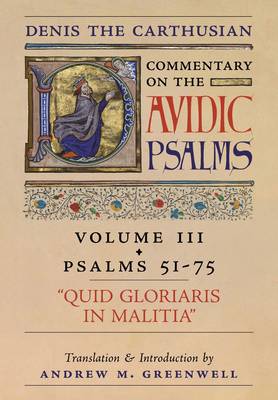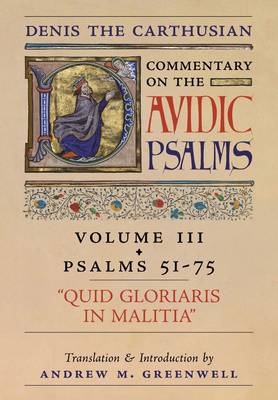
- Afhalen na 1 uur in een winkel met voorraad
- Gratis thuislevering in België vanaf € 30
- Ruim aanbod met 7 miljoen producten
- Afhalen na 1 uur in een winkel met voorraad
- Gratis thuislevering in België vanaf € 30
- Ruim aanbod met 7 miljoen producten
Zoeken
Quid Gloriaris Militia (Denis the Carthusian's Commentary on the Psalms)
Vol. 3 (Psalms 51-75)
Denis The Carthusian
Hardcover | Engels
€ 44,95
+ 89 punten
Uitvoering
Omschrijving
QUID GLORIARIS IN MALITIA, the third of six anticipated volumes translating Denis the Carthusian's (1402-1471) entire Commentary on the Psalms, contains Denis's lively commentary of Psalms 51 through 75. By interpreting the Psalms with a robust Christocentric point of view, and by combining with it the revelation of the one Christ who has spoken through the prophets and who is revealed in the Gospels, Denis often gives us new insight into the mind of Christ. Though never neglecting the literal or historical underlay of the Psalms, Denis teases out for the reader the allegorical, tropological, and anagogical senses of the Psalms, thus providing great spiritual fodder for reflection, meditation, and contemplation of God, sublime and blessed. For Denis, both praying and living the Psalms is a central staple of the Christian conversatio or manner of life; therefore, he constantly insists that the inner heart of man must align itself with the spoken word. The translated Commentary is supplemented by Denis's own copious references to Scripture, but it also includes extensive footnotes that guide a reader who might be unfamiliar with historical, cosmological, biblical, theological, doctrinal, or moral issues raised by Denis in his Commentary. Not long ago, a common refrain among academics was, "He who read Denis, leaves nothing unread." It might also be said that he who does not read Denis's Commentary on the Psalms leaves the Psalms unread. This first-ever English translation of Denis's Commentary on the Psalms makes the riches of his thought, long-too long-neglected, available to a wider audience.
Specificaties
Betrokkenen
- Auteur(s):
- Vertaler(s):
- Uitgeverij:
Inhoud
- Aantal bladzijden:
- 566
- Taal:
- Engels
Eigenschappen
- Productcode (EAN):
- 9781990685019
- Verschijningsdatum:
- 16/07/2022
- Uitvoering:
- Hardcover
- Formaat:
- Genaaid
- Afmetingen:
- 152 mm x 229 mm
- Gewicht:
- 993 g

Alleen bij Standaard Boekhandel
+ 89 punten op je klantenkaart van Standaard Boekhandel
Beoordelingen
We publiceren alleen reviews die voldoen aan de voorwaarden voor reviews. Bekijk onze voorwaarden voor reviews.








